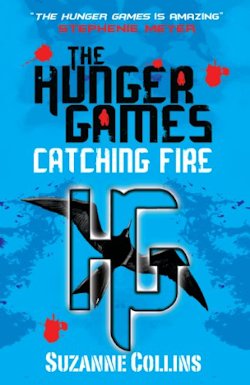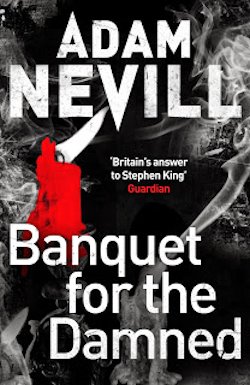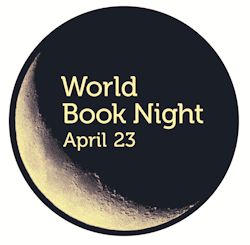Welcome back to the British Genre Fiction Focus, Tor.com’s regular round-up of book news from the United Kingdom’s thriving speculative fiction industry.
Last week, in a bid to cut costs, and in all probability corners, The Times in its infinite literary wisdom decided to fire the estimable children’s book reviewer Amanda Craig. The decision has not been without consequences… neither for the newspaper nor the readers it’s supposed to serve.
Later on, in Cover Art Corner: a new look for Adam Nevill, plus a first look at his next book, No One Gets out Alive.
And finally, the twenty titles that’ll be given away as part of World Book Night in the UK in 2014 have been announced. If you’d like to help get the good word out about a few good books, The Reading Agency are already accepting applications.
Firing a Children’s Champion
Since October 2003, the award-winning journalist and author Amanda Craig has been reviewing children’s books for The Times with the following mission statement in mind:
I will not lie to be kind, but I am very aware how daunting it is if a critic chooses to show off at an author’s expense. Almost every novel ever written is flawed. It can still, however, be enjoyable, interesting, moving or aesthetically pleasing, according to its author’s talents. I see my job as not to advise people on how to get published or to support a marketing team, but to serve the reader by describing a novel accurately, and by giving an estimation of its achievements, according to my personal taste and aesthetic judgement.
Words for critics to live by.
As Craig said to The Bookseller, she takes particular pride in having been “the first to spot J. K. Rowling, Philip Pullman, Cressida Cowell, Francesca Simon and Suzanne Collins among others.” An array of great writers, eh? And without someone like Craig to drum up interest in them, who can say if they’d have made the massive impact on the literary landscape they have? Even the biggest sensations have modest origins, after all.
The fact of the matter is that “children’s literature is one of Britain’s greatest national treasures and it’s not something you can hope to cover well in-house.” But that’s exactly what the powers that be behind The Times have decided to do.

Long story short, last week, Craig lost “the only regular job in journalism [she’s] ever been truly happy doing,” because in a bid to save a buck, The Times have opted to do their own children’s book reviews.
The backlash began almost immediately. On Twitter, Neil Gaiman admitted he was “enormously disappointed” by the decision to cull “a perceptive champion of children’s books” from the pages of the paper, whilst Francesca Simon called The Times “crazy to lose her expertise.”
John Dougherty, chair of the Children’s Writers and Illustrators Group, went far further, writing an open letter to The Times along the following lines:
The importance to children of reading for pleasure, in creating a generation of adult readers and enhancing academic and broader life chances, is incontrovertible. At a time when libraries are closing and story-times have been squeezed from many schools, expert voices like Ms. Craig’s are all the more essential. The Times’ children’s book reviews have until now been one of the few places parents and teachers can find truly authoritative guidance.
With the loss of Ms. Craig’s services we can only assume a decline in the prominence of children’s literature in your pages. It is yet another sign that—however much many of those in positions of influence claim to be concerned about literacy, education and the next generation—short-term thinking and the bottom line are all that matter.
Though The Times’ new literary editor Robbie Millen is “not thought to have instigated Craig’s departure,” he did defend the decision, noting the financial pressure the newspaper has been under in recent years before promising the following: “We will carry on doing children’s book reviews every week and the people who do the reviews are passionate about children’s books.”
To which John Dougherty responded:
I note that you haven’t addressed the thrust of my letter, which is that in dismissing Amanda Craig The Times is dispensing with the services of an highly-regarded expert critic in the field of children’s literature. Unless the “different reviewers” to whom you refer have a similar level of expertise in, understanding of and passion for children’s books—which is unlikely—it seems highly improbable that the attention you pay to them will be unaffected.
Your assurance that there will be no change “other than that we will be using different reviewers” therefore actually reinforces rather than assuages the fear expressed by many of my colleagues in the world of children’s writing, which is that this change reflects a change of attitude at The Times from one that treats children’s literature as important and worthy of consideration to one that sees it as too trivial for expertise to have any value, a field in which one critic’s opinion is really worth neither more nor less than another’s. To quote Joanne Harris, author of Chocolat, in a Tweet posted yesterday: “What @TheTimesBooks doesn’t understand is that 350 words by @AmandaPCraig is worth a hell of a lot more than 350 words by someone else.”
Very well said, sir.
The outrage over Craig’s unceremonious sacking has culminated in a letter of protest. At the time of this writing, its several hundred signatories include the likes of Anthony Horowitz, Cressida Cowell, Philip Pullman, Lauren Child and Frank Cottrell Boyce, not to mention children’s laureate Malorie Blackman.
There’s still time to sign your name to it too: simply Tweet @LucyCoats.
Cover Art Corner: A New Look for Adam Nevill
Just a few weeks on from his second consecutive win of the August Derleth Award for the year’s best horror novel at World Fantasy Con, Adam Nevill’s macabre backlist is getting a timely refresh in the cover art department.

On the UK Tor blog, Editorial Director Julie Crisp unveiled a new look for all four of his previous books—not least Banquet for the Damned. Published by PS Publishing in 2004 before being reprinted by Virgin Books four years later, both editions of Nevill’s debut have sadly fallen out of print since, so for fans who might have missed it—and the man has many—this is simply super news.
For the as-yet uninitiated—who don’t know what they’re missing—here’s a bit about Banquet for the Damned:
Few believed Professor Coldwell could commune with spirits. But in Scotland’s oldest university town something has passed from darkness into light. Now, the young are being haunted by night terrors and those who are visited disappear.
This is certainly not a place for outsiders, especially at night. So what chance do a rootless musician and burned out explorer have of surviving their entanglement with an ageless supernatural evil and the ruthless cult that worships it?
This chilling occult thriller is both an homage to the great age of British ghost stories and a pacy modern tale of diabolism and witchcraft.
Banquet for the Damned will be re-released in March next year… and in October, just in time for Halloween 2014, Nevill’s new novel will be upon us
Now I’ve had my up and downs with the author’s body of work in recent years, but the promise of new Adam Nevill never fails to get my blood up, so it’s with tremendous pleasure that I present to you this first look at the AI for No One Gets out Alive:
A timely and imaginative investigation of the ordinary sociopath, its aiders and abetters, that occasionally shatters the peace of British suburbia, No One Gets out Alive will also encompass the modern blight of organised crime, now considered to constitute 40% of the world’s economy: a greater and more immediate threat than climate change and the War on Terror.
But what is different about Nevill’s novel’s treatment of said subjects is its supernatural dimension, for the presences of past victims and past perpetrators play as much a part in the narrative as the living descendants of a murderous clan, and their still-living perfect victim.
No One Gets out Alive promises to be a truly disturbing tale of physical horror and psychic terror behind closed doors from a bestselling author who has been described “Britain’s answer to Stephen King.”
It’s early yet, but do stay tuned to the British Genre Fiction Focus for more on No One Gets out Alive as and when there’s more to report.
World Book Night News

Finally for today, a note about the announcement of the twenty titles that will be given away next April as part of World Book Night 2014, which includes genre novels by both Matt Haig and Ben Aaronovitch—namely The Humans and Rivers of London—as well as a specially put-together collection of short stories by Roald Dahl.
Through World Book Night we are committed to reaching people in marginalised areas of society, and with this in mind, the 2014 list has been curated with a view to offering a range of brilliant books explicitly chosen to appeal to and inspire people who haven’t yet been turned on to reading.
There is particular emphasis on books for teenagers and young adults, 46% of whom don’t read for pleasure; and men, 42% of whom don’t read for pleasure. The quantity of easy to read and accessible books has also been increased. As well as a wide range of fiction the list features four Quick Reads, five young adult titles, three non-fiction titles and two short story collections.
The book of Roald Dahl short stories is particularly special, as it is a bespoke World Book Night collection of some of his greatest short stories, designed to appeal to young adults who loved his work as children but haven’t gone on to read as adults.
You can take a look at the complete list of titles here on The Reading Agency’s website.
In case you weren’t aware, The Reading Agency is now in charge of World Book Night, whereas in previous years it’s been managed by an independent charity in association with TRA and the BBC. But this new unified strategy appears to be a positive. As reported by The Bookseller late last month, the founder of the annual event, Jamie Byng, is “very optimistic about World Book Night’s future and the ongoing impact it can make both here in the UK and around the world.”
If you’d like to be a book giver come April 23rd 2014—and why wouldn’t you?—The Reading Agency are already accepting applications. Which is to say, if you’d like to help get the good word out about a few good books—and when I say a few, I mean 12,500 copies of each of the twenty titles for a total of 250,000 free books to would-be readers around the UK—then good luck to you.
And that’s it for this week. There will, as ever, be another round-up of bookish news coming your way next Wednesday, and I’d advise you to keep your browsers of choice pointed towards Tor.com for a special December edition of the British Genre Fiction Hitlist this coming Sunday, but for the time being… tatty-bye, guys!
Niall Alexander is an extra-curricular English teacher who reads and writes about all things weird and wonderful for The Speculative Scotsman, Strange Horizons, and Tor.com. He’s been known to tweet, twoo.









